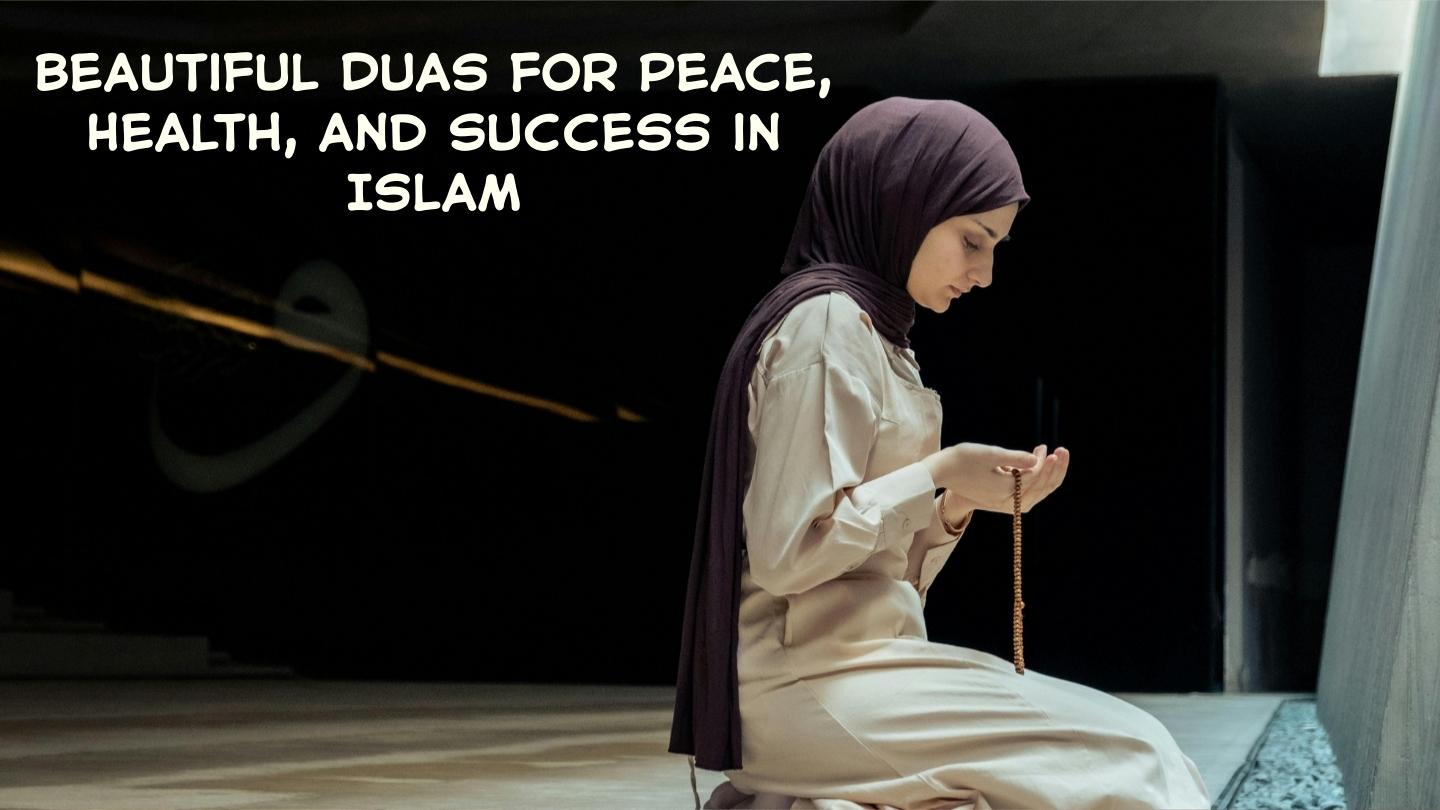Beautiful Duas for Peace, Health, and Success in Islam
Dua (supplication) is a direct way to connect with Allah (SWT) and seek His mercy, guidance, and blessings. Whether you are asking for peace of mind, good health, forgiveness, or worldly and eternal success, dua is a believer’s most powerful tool. In Islam, duas are prescribed for different times and occasions—some for daily life, some for special events like Ramadan, and others for specific needs.
The Prophet Muhammad ﷺ said:
“Dua is the essence of worship.” (Tirmidhi)
In this comprehensive guide, we will cover important duas for daily life, Ramadan duas, duas in English and Arabic, and special supplications like Dua e Istikhara, Nazar ki dua, Taraweeh dua, and more—with Arabic text, transliteration, meaning, and benefits.
Must Read: موقع موعد الاذان – دليلك اليومي للصلاة في كل مكان
Dua Meaning
The word “Dua” (دعاء) literally means supplication or invocation in Arabic. In Islamic terms, a dua is a personal prayer or request made to Allah for guidance, help, forgiveness, protection, or blessings.
Unlike formal prayers (Salah), which follow a set ritual, dua is flexible and can be made anytime and anywhere, in any language, expressing your heart’s deepest desires.
Key Points:
- Connection with Allah: Dua strengthens your spiritual relationship and reliance on Allah.
- Seeking Help: It is a means to ask for guidance in personal, spiritual, or worldly matters.
- Protection & Blessings: Duas are recited for health, success, safety, and protection from harm.
- Forgiveness & Gratitude: Dua allows believers to seek forgiveness for sins and express thankfulness.
In short, dua is the essence of turning to Allah with sincerity, reflecting faith, hope, and devotion.
Must Read: Oldest Religions in the World- A Comprehensive and Detailed Overview
Important Duas for Daily Life in English and Arabic
Daily life duas protect us from harm, bring blessings to our work, and keep us mindful of Allah in every action.
Here are some essential duas every Muslim should know and recite regularly.
Dua for Waking Up
الْحَمْدُ لِلَّهِ الَّذِي أَحْيَانَا بَعْدَ مَا أَمَاتَنَا وَإِلَيْهِ النُّشُورُ
Transliteration:
Alhamdu lillahil-ladhi ahyana ba‘da ma amatana wa ilayhin-nushoor.
Meaning: All praise is for Allah who gave us life after causing us to die, and to Him is the return.
Benefit: Reminds you of the resurrection and starts your day with gratitude.
Dua Before Sleeping
بِاسْمِكَ اللَّهُمَّ أَمُوتُ وَأَحْيَا
Transliteration:
Bismika Allahumma amootu wa ahya.
Meaning:
In Your name, O Allah, I die and I live.
Benefit:
Seeks Allah’s protection during sleep and reminds us that life and death are in His hands.
Dua Before Eating
بِسْمِ ٱللَّهِ ٱلرَّحْمَٰنِ ٱلرَّحِيمِ
Transliteration:
Bismillah.
Meaning: In the name of Allah.
Benefit: Protects your food from Shaytan’s interference.
Dua After Eating
الْحَمْدُ لِلَّهِ الَّذِي أَطْعَمَنَا وَسَقَانَا وَجَعَلَنَا مُسْلِمِينَ
Transliteration:
Alhamdu lillahil-ladhi at‘amana wa saqana wa ja‘alana muslimin.
Meaning: All praise is for Allah who fed us, gave us drink, and made us Muslims.
Dua Before Leaving Home
بِسْمِ اللَّهِ، تَوَكَّلْتُ عَلَى اللَّهِ، وَلَا حَوْلَ وَلَا قُوَّةَ إِلَّا بِاللَّهِ
Transliteration:
Bismillah, tawakkaltu ‘ala Allah, wa la hawla wa la quwwata illa billah.
Meaning:
In the name of Allah, I place my trust in Allah, and there is no power or might except with Allah.
Dua When Entering Home
بِسْمِ اللَّهِ وَلَجْنَا وَبِسْمِ اللَّهِ خَرَجْنَا، وَعَلَى اللَّهِ رَبِّنَا تَوَكَّلْنَا
Transliteration:
Bismillahi walajna wa bismillahi kharajna wa ‘ala Allahi Rabbina tawakkalna.
Meaning:
In the name of Allah we enter, in the name of Allah we leave, and upon our Lord we rely.
Dua for Seeking Guidance
رَبَّنَا لَا تُزِغْ قُلُوبَنَا بَعْدَ إِذْ هَدَيْتَنَا وَهَبْ لَنَا مِنْ لَدُنْكَ رَحْمَةً
Transliteration:
Rabbana la tuzigh quloobana ba’da ith hadaytana wahab lana min ladunka rahmah
Meaning:
Our Lord, let not our hearts deviate after You have guided us and grant us mercy from Yourself.
Dua for Forgiveness
رَبِّ اغْفِرْ لِي وَتُبْ عَلَيَّ إِنَّكَ أَنْتَ التَّوَّابُ الرَّحِيمُ
Transliteration:
Rabbi ighfir li wa tub ‘alayya innaka anta at-Tawwab ar-Raheem
Meaning:
My Lord, forgive me and accept my repentance; indeed, You are the Most Accepting of Repentance, Most Merciful.
Dua for Protection from Evil
أَعُوذُ بِكَلِمَاتِ اللَّهِ التَّامَّةِ مِنْ شَرِّ مَا خَلَقَ
Transliteration:
A’udhu bikalimatillahi at-tammah min sharri ma khalaq
Meaning:
I seek refuge in the perfect words of Allah from the evil of what He has created.
Dua for Health & Healing
اللَّهُمَّ اشْفِنِي شِفَاءً لَا يُغَادِرُ سَقَمًا
Transliteration:
Allahumma ishfini shifa’an la yughadiru saqama
Meaning:
O Allah, grant me healing that leaves no disease behind.
Dua for Sustenance & Provision
رَبَّنَا آتِنَا فِي الدُّنْيَا حَسَنَةً وَفِي الْآخِرَةِ حَسَنَةً وَقِنَا عَذَابَ النَّارِ
Transliteration:
Rabbana atina fid-dunya hasanatan wa fil-akhirati hasanatan waqina ‘adhaban-nar
Meaning:
Our Lord, give us good in this world and good in the Hereafter and save us from the punishment of the Fire.
Dua for Parents
رَبِّ اغْفِرْ لِي وَلِوَالِدَيَّ وَارْحَمْهُمَا كَمَا رَبَّيَانِي صَغِيرًا
Transliteration:
Rabbi ighfir li waliwalidayya warhamhuma kama rabbayani saghiran
Meaning:
My Lord, forgive me and my parents, and have mercy on them as they brought me up when I was small.
Dua for Relief from Anxiety & Stress
اللَّهُمَّ إِنِّي أَعُوذُ بِكَ مِنَ الهَمِّ وَالحَزَنِ
Transliteration:
Allahumma inni a’udhu bika minal-hammi wal-hazan
Meaning:
O Allah, I seek refuge in You from worry and grief.
Dua for Gratitude
الْحَمْدُ لِلَّهِ عَلَى كُلِّ حَالٍ
Transliteration:
Alhamdulillah ‘ala kulli hal
Meaning:
All praise is for Allah in every situation.
Dua for Success
رَبِّ زِدْنِي عِلْمًا وَفَهْمًا وَهِدَايَةً
Transliteration:
Rabbi zidni ilma wa fahma wa hidayah
Meaning:
My Lord, increase me in knowledge, understanding, and guidance.
Ramadan Dua List
Ramadan is the holiest month for Muslims, and it is divided into three Ashras (ten-day periods). Each Ashra has a special focus and a unique dua. These duas are not only easy to remember but also carry deep spiritual benefits. Reciting them with sincerity can bring mercy, forgiveness, and salvation.
First Ashra of Ramadan – Dua for Mercy (Rahmah)
رَبِّ اغْفِرْ وَارْحَمْ وَأَنْتَ خَيْرُ الرَّاحِمِينَ
Transliteration:
Rabbi ighfir warham wa anta khayrur-raahimeen.
Meaning:
My Lord, forgive and have mercy, and You are the best of the merciful.
Benefit:
The first ten days of Ramadan are days of mercy. Reciting this dua helps attract Allah’s mercy, which opens the doors of blessings, guidance, and peace in this life and the Hereafter.
Second Ashra of Ramadan – Dua for Forgiveness (Maghfirah)
أَسْتَغْفِرُ اللَّهَ رَبِّي مِنْ كُلِّ ذَنْبٍ وَأَتُوبُ إِلَيْهِ
Transliteration:
Astaghfirullaha Rabbi min kulli dhambin wa atoobu ilayh.
Meaning:
I seek forgiveness from Allah, my Lord, for every sin I have committed, and I turn to Him in repentance.
Benefit:
The second ten days of Ramadan are days of forgiveness. This dua purifies the heart, wipes away sins, and strengthens your connection with Allah.
Third Ashra of Ramadan – Dua for Salvation from Hellfire (Nijat)
اللَّهُمَّ أَجِرْنِي مِنَ النَّارِ
Transliteration:
Allahumma ajirni minan-naar.
Meaning:
O Allah, save me from the Hellfire.
Benefit:
The last ten days of Ramadan are days of seeking protection from Hellfire. Reciting this dua sincerely ensures Allah’s safety and mercy in the Hereafter.
Dua for Sehri (Intention of Fasting)
وَبِصَوْمِ غَدٍ نَّوَيْتُ مِنْ شَهْرِ رَمَضَانَ
Transliteration:
Wa bisawmi ghadin nawaytu min shahri Ramadan.
Meaning:
I intend to keep the fast tomorrow in the month of Ramadan.
Benefit:
This intention (niyyah) is essential for the validity of the fast and mentally prepares you for the day.
Dua for Iftar (Breaking the Fast)
اللَّهُمَّ إِنِّي لَكَ صُمْتُ، وَبِكَ آمَنتُ، وَعَلَيْكَ تَوَكَّلْتُ، وَعَلَى رِزْقِكَ أَفْطَرْتُ
Transliteration:
Allahumma inni laka sumtu wa bika aamantu wa ‘alayka tawakkaltu wa ‘ala rizqika-aftartu.
Meaning:
O Allah! I fasted for You, and I believe in You, and I put my trust in You, and with Your provision I break my fast.
Benefit:
Brings spiritual reward, expresses gratitude, and affirms faith at the moment of breaking fast.
Dua for Laylatul Qadr (The Night of Decree)
اللَّهُمَّ إِنَّكَ عَفُوٌّ تُحِبُّ العَفْوَ فَاعْفُ عَنِّي
Transliteration:
Allahumma innaka ‘afuwwun tuhibbul-‘afwa fa‘fu ‘anni.
Meaning:
O Allah, You are Forgiving, You love to forgive, so forgive me.
Benefit:
This dua is directly taught by the Prophet ﷺ to Aisha (RA) for the most blessed night of Ramadan.
Dua for Breaking Fast of Another Person
أَفْطَرَ عِنْدَكُمُ الصَّائِمُونَ، وَأَكَلَ طَعَامَكُمُ الأَبْرَارُ، وَصَلَّتْ عَلَيْكُمُ المَلَائِكَةُ
Transliteration:
Aftara ‘indakumus-saa’imoon, wa akala ta‘aamakumul-abraar, wa sallat ‘alaykumul-malaa’ikah.
Meaning:
May the fasting people break their fast with you, may the righteous eat your food, and may the angels send blessings upon you.
Benefit:
Brings immense reward for those who feed others at iftar.
Dua for the Start of Ramadan
اللَّهُمَّ أَهِلَّهُ عَلَيْنَا بِاليُمْنِ وَالإِيمَانِ، وَالسَّلاَمَةِ وَالإِسْلاَمِ، وَالتَّوْفِيقِ لِمَا تُحِبُّ وَتَرْضَى
Transliteration:
Allahumma ahillahu ‘alayna bilyumni wal imani, was-salamati wal-islami, wat-tawfeeqi lima tuhibbu wa tardha.
Meaning:
O Allah! Let this moon appear upon us with blessing, faith, safety, and Islam, and with the success of all that You love and are pleased with.
Benefit:
Welcomes the blessed month with gratitude and optimism.
Dua for the End of Ramadan
اللَّهُمَّ تَقَبَّلْ مِنَّا شَهْرَ رَمَضَانَ، وَاجْعَلْنَا مِنَ الفَائِزِينَ
Transliteration:
Allahumma taqabbal minna shahra Ramadan, waj‘alna minal faa’izeen.
Meaning:
O Allah! Accept from us the month of Ramadan and make us among the successful.
Benefit:
Shows humility, asking Allah to accept all worship done during the month.
Taraweeh ki Dua Hindi
Taraweeh prayers are special night prayers performed during Ramadan after Isha. Reciting the correct dua before or after Taraweeh helps increase spiritual connection and earn Allah’s blessings.
“अल्लाहुम्माज्अलनाफ़ीमा तला वल्ना मिनल-क़ुरआनि मुझ्रब्बा, वलना फ़ीह मिनकुल्ली सऊ इला ख़ैरिन मकरब्बा, वअस्लिह बिहि अहवालना वाअफ़िस बिहि अमालना, वअक़्ज़ि बिहि दुऊनाना, वनव्विर बिहि क़ुलूबना, ववस्सिअ बिहि अर्साक़ना, वश्फ़िहि मरीज़ना, वरहम बिहि मउताना, वलातज्अलहु आख़िरल-अहदि मिन्ना।”
اللّهُمَّ اجعل صلاتي في رمضان مقبولة واغفر لي ذنوبي
Hindi Meaning:
हे अल्लाह, मेरे रमज़ान की नमाज़ को स्वीकार करें और मेरे गुनाहों को माफ़ करें।
When to Recite:
- Before starting Taraweeh
- After completing the Taraweeh prayers
Benefits:
- Enhances the spiritual reward of nightly prayers
- Strengthens mindfulness and devotion
- Brings inner peace and closeness to Allah
Dua e Istikhara
Making big decisions in life can be challenging, whether it’s about marriage, career, or any other important matter. Dua e Istikhara is a special prayer in Islam that helps you seek guidance from Allah (SWT) to choose the best path. Performing Istikhara allows you to leave your worries in Allah’s hands and trust His wisdom.
اَللّهُمَّ إِنِّي أَسْتَخِيرُكَ بِعِلْمِكَ وَأَسْتَقْدِرُكَ بِقُدْرَتِكَ وَأَسْأَلُكَ مِنْ فَضْلِكَ الْعَظِيمِ
Transliteration:
Allahumma inni astakhiruka bi’ilmika wa astaqdiruka bi-qudratika wa as’aluka min fadlika al-‘azim
Meaning:
O Allah, I seek guidance from Your knowledge, and I seek power from Your strength, and I ask You from Your great bounty.
Step-by-Step Guide to Performing Istikhara
Perform Wudu (Ablution): Start with a clean state by performing wudu.
Offer Two Rak’ahs (Units) of Prayer: Pray two voluntary rak’ahs sincerely asking for guidance.
Recite the Istikhara Dua: After the prayer, recite the Istikhara dua with full concentration and humility.
Ask Allah for Guidance: In your heart, mention the decision you are seeking guidance for and ask Allah to guide you to what is best.
Trust Allah’s Signs and Feelings: After making the dua, pay attention to your feelings, thoughts, and opportunities. Sometimes guidance comes through ease in decision-making, a sense of peace, or circumstances.
Benefits:
- Helps you make confident and wise choices.
- Reduces anxiety and stress about important decisions.
- Strengthens your connection with Allah and reliance on His wisdom.
Nazar ki Dua in English
The evil eye (Nazar) is believed to cause harm through envy or jealousy. Nazar ki Dua is a protective prayer that seeks Allah’s safeguard from negative energy and harm.
أَعُوذُ بِكَلِمَاتِ اللهِ التَّامَّةِ مِنْ كُلِّ شَيْطَانٍ وَهَامَّةٍ وَمِنْ كُلِّ عَيْنٍ لَامَّةٍ
Transliteration:
A’udhu bikalimatillahi al-tammati min kulli shaytanin wa hammah, wa min kulli ‘aynin lammah
Meaning:
I seek refuge in the perfect words of Allah from every devil and harmful creature, and from every evil eye.
Benefits:
- Provides protection from jealousy and negative energy.
- Helps keep your family, home, and possessions safe.
- Strengthens spiritual awareness and reliance on Allah.
Dua for Palestine
The ongoing struggles in Palestine call for prayers for protection, justice, and peace. This dua seeks Allah’s mercy and support for the oppressed.
اللّهُمَّ احمِ الشعب الفلسطيني وامْنَحْهُمُ العَدْلَ وَالأمْنَ وَالْسلامَ
Transliteration:
Allahumma ahmi al-sha‘b al-Filastini wa amnahum al-‘adl wal-amn was-salam
Meaning:
O Allah, protect the people of Palestine and grant them justice, safety, and peace.
Benefits:
- Prays for protection and relief for oppressed communities.
- Encourages solidarity and empathy through dua.
- Strengthens faith in Allah’s justice and mercy.
Dua e Qunoot (Recited in Witr Prayer)
Dua e Qunoot is a powerful dua asking Allah for guidance, protection, blessings, and forgiveness. Both Shafi and Hanafi schools of thought have authentic versions.
Shafi Version
اللَّهُمَّ اهْدِنِي فِيمَنْ هَدَيْتَ وَعَافِنِي فِيمَنْ عَافَيْتَ وَتَوَلَّنِي فِيمَنْ تَوَلَّيْتَ وَبَارِكْ لِي فِيمَا أَعْطَيْتَ وَقِنِي شَرَّ مَا قَضَيْتَ إِنَّكَ تَقْضِي وَلاَ يُقْضَى عَلَيْكَ وَإِنَّهُ لاَ يَذِلُّ مَنْ وَالَيْتَ وَلاَ يَعِزُّ مَنْ عَادَيْتَ تَبَارَكْتَ رَبَّنَا وَتَعَالَيْتَ
Transliteration:
Allahumma ihdini feeman hadayt, wa a’fini fiman afait, wa tawallani fiman tawallait, wa barik li fima atait, wa qini sharra ma qadait, fa innaka taqdi wa la yuqda ‘alayk, wa innahu la yadhillu man walait, wa la ya’izzu man ‘ādait, tabarakta Rabbana wa ta’alait.
Meaning (English):
“O Allah, guide me among those You have guided, pardon me among those You have pardoned, befriend me among those You have befriended, bless me in what You have granted, and save me from the evil that You decreed. Indeed, You decree, and none can pass decree upon You. He is not humiliated whom You have befriended, and he is not honored whom You have taken as Your enemy. Blessed are You, our Lord, and Exalted.”
Hanafi Version
اَللَّهُمَّ اِنَّا نَسۡتَعِيۡنُكَ وَنَسۡتَغْفِرُكَ وَنُؤۡمِنُ بِكَ وَنَتَوَكَّلُ عَلَيۡكَ وَنُثۡنِىۡ عَلَيۡكَ ٱلۡخَيۡرَ وَنَشۡكُرُكَ وَلَا نَكۡفُرُكَ وَنَخۡلَعُ وَنَتۡرُكُ مَنۡ يَّفۡجُرُكَ. اَللَّهُمَّ اِيَّاكَ نَعۡبُدُ وَلَكَ نُصَلِّئ وَنَسۡجُدُ اِلَيۡكَ نَسۡعٰى ونَحۡفِدُ ونَرۡجُوۡا رَحۡمَتَكَ وَنَخۡشٰى عَذَابَكَ اِنَّ عَذَابَكَ بِالۡكُفَّارِ مُلۡحِقٌٌ
Transliteration:
Allahumma inna nasta-eenoka wa nastaghfiruka wa nu’minu bika wa natawakkalu ‘alayka wa nusni ‘alaikal khair, wa nashkuruka wala nakfuruka wa nakhla‘u wa natruku mai yafjuruka. Allahumma iyyaka na‘budu wa laka nusalli wa nasjudu wa ilayka nas‘aa wa nahfidu wa narju rahmataka wa nakhsha ‘adhabaka. Inna ‘adhabaka bil kuffari mulhiq.
Meaning (English):
“O Allah! We seek Your help and ask Your forgiveness. We believe in You, rely upon You, praise You, and are grateful to You. We disassociate from those who disobey You. O Allah, You alone we worship, and to You we pray and prostrate. We strive and serve, hoping for Your mercy and fearing Your punishment. Surely, Your punishment will overtake the disbelievers.”
Must Read: Top 20 Hazrat Ali (RA) Quotes
Safar ki Dua
Traveling can be challenging, and Islam encourages seeking Allah’s protection during journeys. Reciting Safar ki Dua brings safety, ease, and blessings.
سُبْحَانَ الَّذِي سَخَّرَ لَنَا هَذَا وَمَا كُنَّا لَهُ مُقْرِنِينَ وَإِنَّا إِلَى رَبِّنَا لَمُنْقَلِبُونَ
Transliteration:
Subhana allathee sakhkhara lana hatha wama kunna lahu muqrineen wa inna ila rabbina lamunqaliboon
Meaning:
“Glory be to Him Who has subjected this (vehicle) to us, and we could never have done it by ourselves. Surely, to our Lord we shall return.”
When to Recite:
- At the start of the journey
- When entering any mode of transportation
Benefits:
- Ensures Allah’s protection throughout the journey
- Brings peace and confidence to the traveler
Azan ke Baad ki Dua
Reciting Dua after Azan is highly recommended in Islam as it is a moment when prayers are more likely to be accepted.
اللّهُمَّ رَبَّ هَذِهِ الدَّعْوَةِ التَّامَّةِ، وَالصَّلاةِ الْقَائِمَةِ، آتِ مُحَمَّدًا الْوَسِيلَةَ وَالْفَضِيلَةَ، وَابْعَثْهُ مَقَامًا مَحْمُودًا الَّذِي وَعَدْتَهُ
Transliteration:
Allahumma rabba hadhihi ad-da‘watit-tammah, was-salatil-qa’imah, ati Muhammad al-wasilata wal-fadilah, wab‘ath-hu maqaman mahmoodan alladhi wa‘adtahu
Meaning:
“O Allah, Lord of this perfect call and the prayer to be established, grant Muhammad the intercession and privilege, and raise him to the honored station You have promised him.”
When to Recite:
- Immediately after hearing the call to prayer (Azan)
- Anywhere, not limited to the mosque
Benefits:
- Invokes blessings for the Prophet (PBUH)
- Helps prayers and supplications be accepted by Allah
Final Thought
Duas are very special for every Muslim. They help us connect with Allah and ask for guidance, protection, and blessings. There are duas for daily life, Ramadan, traveling, or tough times. Each dua has great meaning and makes our faith stronger.
Recite these duas in Arabic, English, or your language. Doing so brings peace, success, and protection in life. Use them every day, share with family and friends, and feel calm and strong. The real power of dua is in sincere words and a pure heart.







